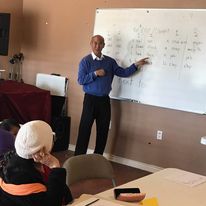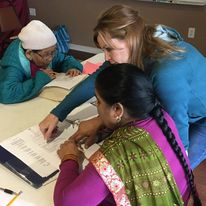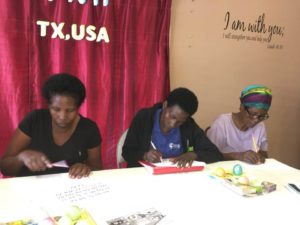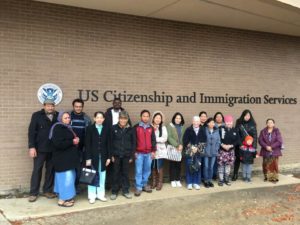Бар’єри для навчання та момент «Ага»
Бар’єри для навчання та момент «Ага», (Ukrainian) Barriers to Education and the Aha moment
Part 1 – Barriers to Education (from an ESL perspective)
I teach Ukrainian refugees on job training on Wednesdays. Mondays and Wednesdays I teach Central and South Americans in Intermediate Grammar. As an English as a Second Language teacher, I am familiar with the education barriers that refugees come with. For years ESL teachers have walked into classrooms all over the world where English is NOT spoken and BAM the class begins.
barriers that refugees come with. For years ESL teachers have walked into classrooms all over the world where English is NOT spoken and BAM the class begins.
Equally for many years ESL teachers, Krashen and Terrell[1] have charted a course for teachers navigating a classroom that has students who 1) Know no English, 2) May not be literate in their own language, 3) have never been in a class environment (Many of my Afghanistan and African women were never allowed in school) and 4) have no computer tech skills (or cell phone app skills).
For refugees, fear of the classroom (and its unknowns – affective filters/cross cultural barriers) arrive on the first day of class. Much is racing through their minds, education barriers abound. I use food and tea, by the way, to break through some of those barriers. It is all about meeting them where they are and making them at ease.
Understanding their background (what they know) and linking it to what I teach are one of my teacher tools. Scaffolding comes next. Having some linguistic rung to which they can grab and start climbing peppers my handouts and activities.
Children up to age 12, it is said, can learn every sound that the voice/mouth/tongue can make.
They are natural linguists. Then with the onset of puberty (plus attitude!), the natural “acquisition” of language changes. “Learning” a language becomes more cognitive as they grow older. Then as they mature “how they think about learning” metacognitively assists them in learning a language. (Meyer and Land 2006)[2]. While Anastasia Efklides, Chapter 4 Metacognition, affect, and conceptual difficulty, focuses on mathematics (something I no longer do in public), teachers of ESL live in the world of metacognition. How do my students learn, what will break down the barriers to the ESL learning? Activities, role plays, games become tools in our ESL toolbag to breakdown the education barriers.
How do we break down these barriers in the US for internationals?
Content based instruction is used in our schools for children who speak another language at home. They learn English while simultaneously learning biology, math, history etc… The idea is comprehensive input. The students are FOCUSED on the history lesson. The vocabulary and dialogue that comes with learning about the pyramids (with pictures/videos etc) provide the background (something they recognize) and the then the teacher creates the scaffolding where they linguistically put two and two together. Pirámide in Spanish is Pyramid in English….Ah, I get it know (says the student). Connections are made.
Part 2: Момент Ага (Russian) The Aha Moment OR Momentul Aha
“A threshold concept can be considered as akin to a portal, opening up a new and previously inaccessible way of thinking about something.”[3] (p.4)
It is wonderful to see when the light bulb goes on in the ESL classrom. The AHA moment.
Moving out of the ESL classroom. When do Aha/threshold/portal moments happen? Catrinesu says…Let our minds rest. She describes the Default Mode Network (DMN), which activates when we close our eyes. Brains at rest, let our brains do nothing, she says. During that state of DMN is when new connections are made for neurons (closed eyes and rest has become the dating service of the brain). Genius, she says, is not a chance occurrence.
Ina Catrinescu (Moldovan)– speaks to the Aha Moments: See Aha! Moments: The art & science of breakthroughs | Ina Catrinescu | TEDxTirguMures https://www.youtube.com/watch?v=FDNy9HFEcaM
Skip to: Doing nothing at the 9:10 minute mark.
Matt Golden in, The search for “aha!” moments, speaks to innovate ideas in the theater. Skip to 3:15 Innovative ideas
Lisa Highfill, uses Hyper docs in her Before the Aha Moment – A Look at Learning | Lisa Highfill | Establishing Hyper docs. TEDxRidderParkDriveEDhttps://www.youtube.com/watch?v=6spD61HT9rE
Skip to 6:31 Teachers are the architects of Learning Experiences
Conclusion: On a particular bad day (I was having a not so spiritual argument with a Dutch missionary), I was fuming in my angry little world. An African refugee girl walked into my community center (which was closed…she just walked in) and started talking to me. She chatted for about 5 minutes until I asked her if she knew who I was. She said, “Yes, you are them man who tells us stories.” (Of Christ).
“Yes, baby girl”, I said, ” I am.” My spiritual AHA moment.
[1] Mahnke, Kathleen. 1985. “THE NATURAL APPROACH: LANGUAGE ACQUISITION IN THE CLASSROOM, Stephen D. Krashen and Tracy D. Terrell. Oxford: Pergamon Press, 1983. Pp. vi + 191.” Studies in Second Language Acquisition 7 (3): 364–65. https://doi.org/10.1017/S0272263100005659.
[2] Meyer, Jan, and Ray Land. 2006. : : Threshold Concepts and Troublesome Knowledge. London: Routledge. https://doi.org/10.4324/9780203966273.
[3] Meyer, Jan, and Ray Land. 2006. Overcoming Barriers to Student Understanding: Threshold Concepts and Troublesome Knowledge. London: Routledge. https://doi.org/10.4324/9780203966273.p.4
13 responses to “Бар’єри для навчання та момент «Ага»”
Leave a Reply
You must be logged in to post a comment.




Russell, what diverse experiences you have to share. Your recollections make me think about the times I have had aha moments in foreign cultures, as well as watching it happen in others.
I especially appreciate the intentionality you bring to teaching that allows the learner to work at their pace. That was called out in our reading, and you have translated that in to practice. Thanks for sharing!
Covid 2020, was a tough year for me. We moved from Fort Worth, Texas to Colorado Springs. Because I was recovering from Covid myself, I was laid out with pneumonia and the recovery left me in an isolated place. I was a frustrated angry man. When the opportunity came to teach ESL (at Pikes Peak State College) I had another AHA moment. I loved being in the classroom teaching students, waiting and watching for their AHA moments. Life is equally good when my students in my “International Peace and Conflict class” come across a new way of deciphering the complexities of the field. AHA! the way opens before me student as an active bystander is rejuvenates my internal battery.
Thanks for your comments Jennifer. I found the reading a bit arduous and my AHA moment was bringing the concepts to work that I have done and will do. Shalom!
I’m so glad you shared in depth from the perspective of ESL education. Scaffolding and affective filters are so foundational to serving ESL students. You mentioned using food and tea to put students at ease. When I was a teacher I used to be such a clown to make the students laugh and show them that it was ok to look a little silly. Even if they made grammar mistakes, they still weren’t going to look as goofy as their teacher who was totally hamming it up. I think my approach has changed a bit in my old(er) age but putting others at ease is still very important. Even as I write this, I’m realizing the importance of putting parents (my ministry focus) at ease. Maybe you’re also thinking about how to use affective filters to reach church leaders who are unsure about their commitment to refugees (if I recall, your ministry focus)?
Wow, an AHA moment! Addressing the affective filters/barriers that church pastors have towards refugee work! I really need to explore that. Thanks so much for sending me this comment!
Hi Russell,
Thank you for sharing your joy in teaching and attention to others learning processes and AHA moments! I appreciate how you pulled in another resource that help me understand the reading. You cited Ina Catrinesu, regarding threshold moments, “Let our minds rest. She describes the Default Mode Network (DMN), which activates when we close our eyes. Brains at rest, let our brains do nothing.” Of course our brains need rest. I can get so caught up in trying to figure something out that I need to remember to pause and step a way. I am learning to set aside my efforts, get my mind on something else, clear my thoughts, close my eyes, rest or just go to bed.When I do this, the elusive an AHA moment eventually comes. I woke up to an AHA moment at 2am last week. I had to get up and write it down. That’s not ideal! I am hoping they come during the day time hours in the future. How are you practicing this helpful insight? How are you resting your brain?
Jenny, I think I am beginning to seek out the The Default Mode Network. I used to think studying at home was a distraction. Cleaning, cooking and repeat seemed to be a distraction. Now during these seemingly mundane domestic moments, I find my mind floating with out pressure about the academic tasks at hand. Small Aha moments are triggered while I move about in DMN. I now seek out the breaks that really are allowing my brain to “storm” out new ideas.
OMG! I absolutely love hearing you talk about your work. The passion and commitment that you have is remarkable…but this:
“On a particular bad day (I was having a not so spiritual argument with a Dutch missionary), I was fuming in my angry little world. An African refugee girl walked into my community center (which was closed…she just walked in) and started talking to me. She chatted for about 5 minutes until I asked her if she knew who I was. She said, “Yes, you are them man who tells us stories.” (Of Christ).”
It brought tears to my eyes. God uses the most amazing moments to reach us. Think about it, you were having a heated discussion “a not so spiritual discussion” is how you phrased it and God chose that moment to remind you of your gifts, of how you are working within the will of God. Keep it up… you are changing lives and making a tremendously positive impact on future generations.
Working with children is not something I thought I would be good at. Sometimes they can be such a drain, but when we see change, when we see them grown towards Christ – the journey is worth taking.
I am saddened that I don’t have the opportunities to work with children these days, mostly adults, but even so, I get a rush when the light bulb/Aha moment flickers on!
Russell, I enjoyed how you paralleled your experience as and ESL instructor with our reading. I am thrilled to part of this Doctorate because it includes the Global Perspectives piece. Participating and visiting and becoming more than a tourist was the best part of South Africa and I so look forward to year 2 and 3 travels. I think getting out of our comfort zone is key to experience new thresholds. Thank you for the work you do and I believe the key to what you do is create trust and rapport by offering hospitality in a way that speaks to them by offering tea and food. I often explain to potential Palliative and Hospice families that what we do is provide scaffolding for a family and patient as they go through a difficult time. We try to help them from crumbling under this new way of being. Thank you for what you do, how you show hospitality as a way to ease orientation. How often do you experience the aha moments yourself from ways of learning from your students?
Howdy from Colorado Springs. The weather has plummeted to about 5 degrees and I just picked up my daughter from the Air Force Academy. In the foggy drive up the “hill.” I was surrounded by wintery fog. Hard to see, I focused on the person in front of me to keep on the road. My students are sort of like that. I THINK I have most of the answers, and then BAM, one of them will have an insight that I never thought of. Recently, one of my African students responded to the unkind comments of President Macron when he visited Africa hoping to garner support against “Putin’s War.” My student was so distressed. He said, “Doesn’t that man understand us?, Staying neutral is how we will survive in the growing super power conflict.” AHA, I never thought about the African country (in this case Zimbabwe) perspective. Neutrality means survival. Wow….I put myself in their shoes, just for an instance, and BAM a paradigm shift. Nice…Shalom Jana…Russ
I like your story as an ESL teacher, especially with methods like banquets with food and tea. It broughts a more intimate and welcoming atmosphere where people feel so embraced. It looks like I also want to be your student (Haha). I’m just wondering, what is the biggest barrier for you and your students to cross the threshold?
Hmmm…when does the light bulb go on? It is so different for each person. It is like sharing the gospel. We have to meet them where they are, but the Holy Spirit convicts of sin! But when does it happen in the classroom. Sometimes you have to manufacture activities that bring them to a new place (like a test). I use tests as learning tools. The anxiety level goes up! I do have a pre-test, test, then a post test. This hammers the correct answers. Do they learn from it? The jury is out on that, but it is one way I bring them to the threshold experience.